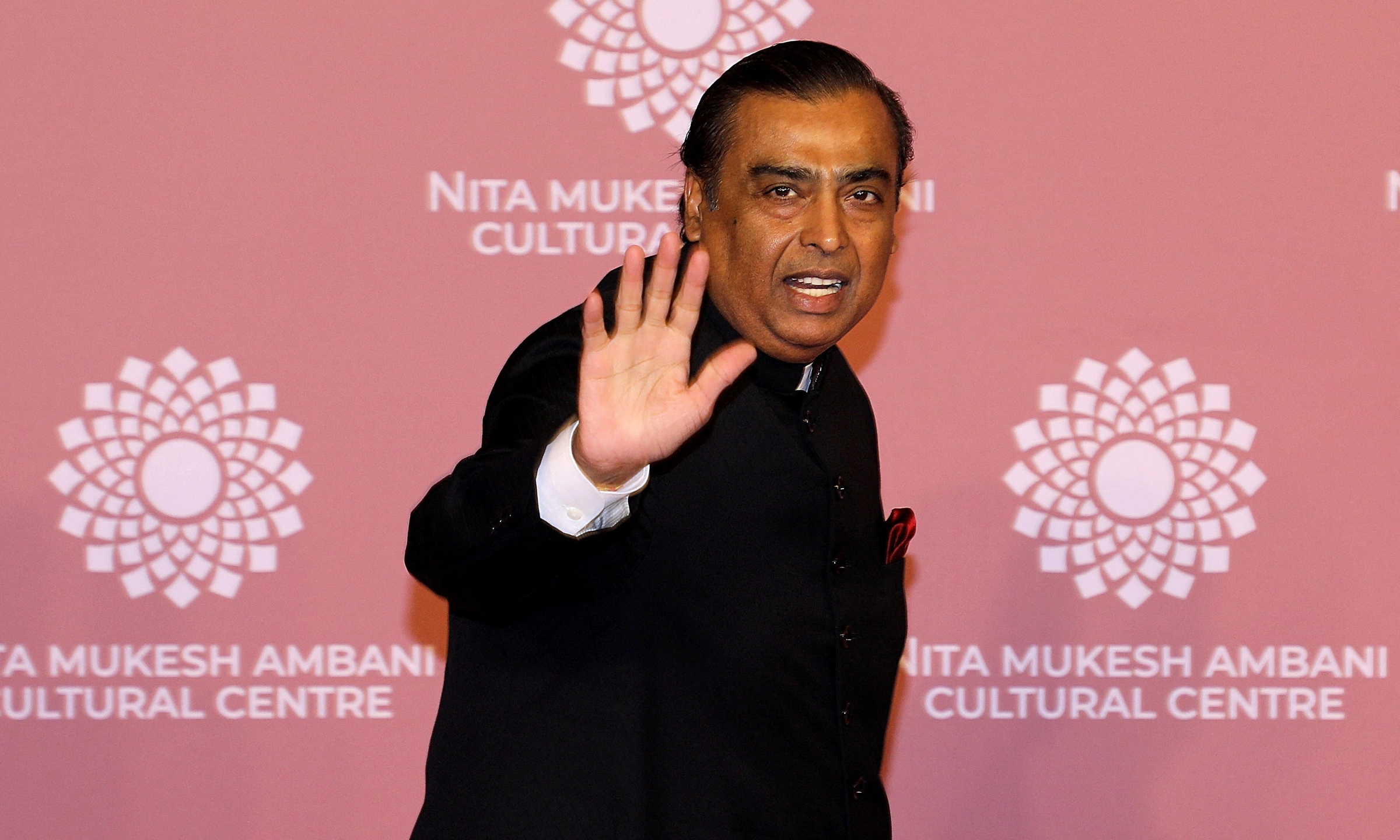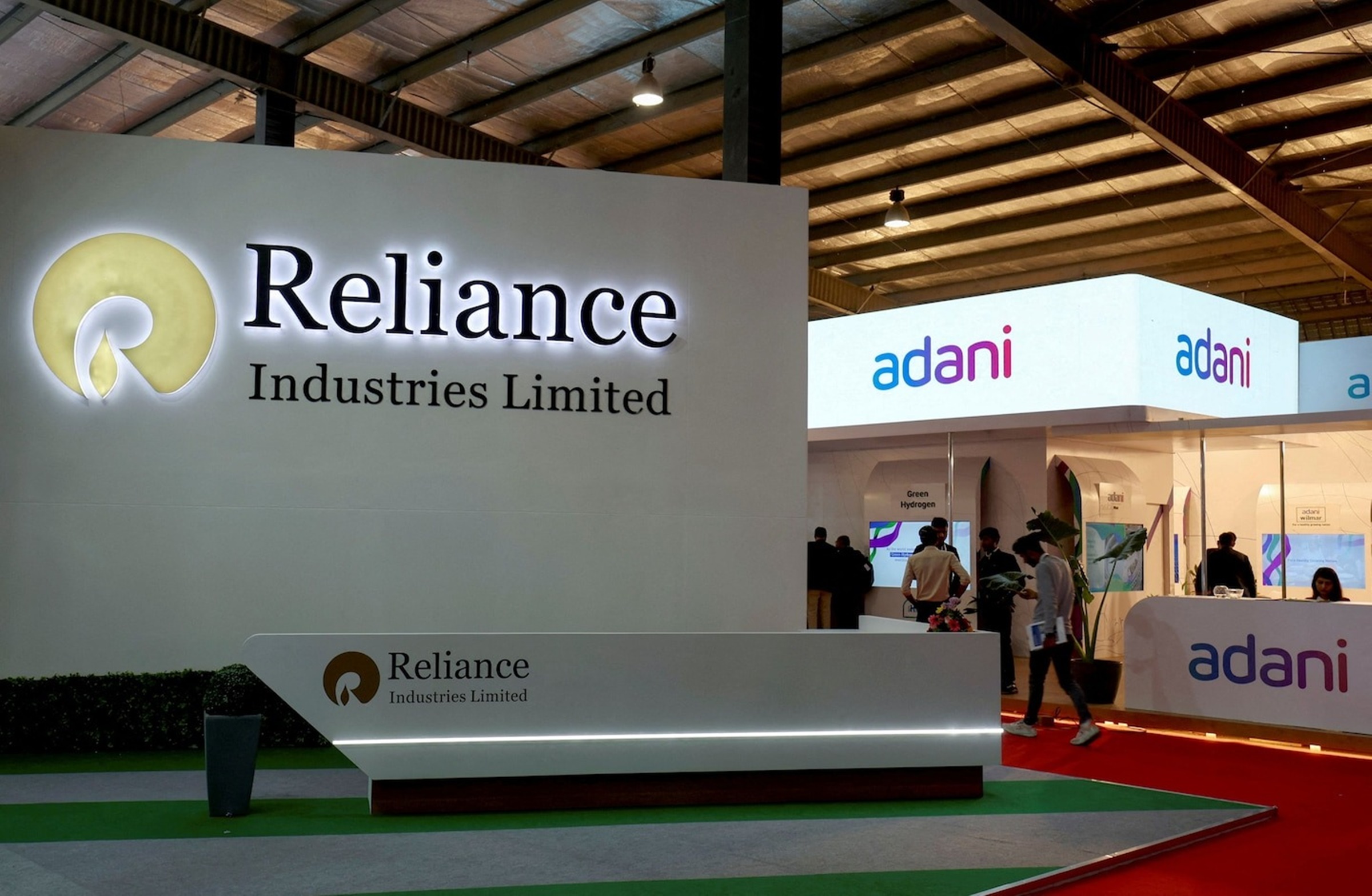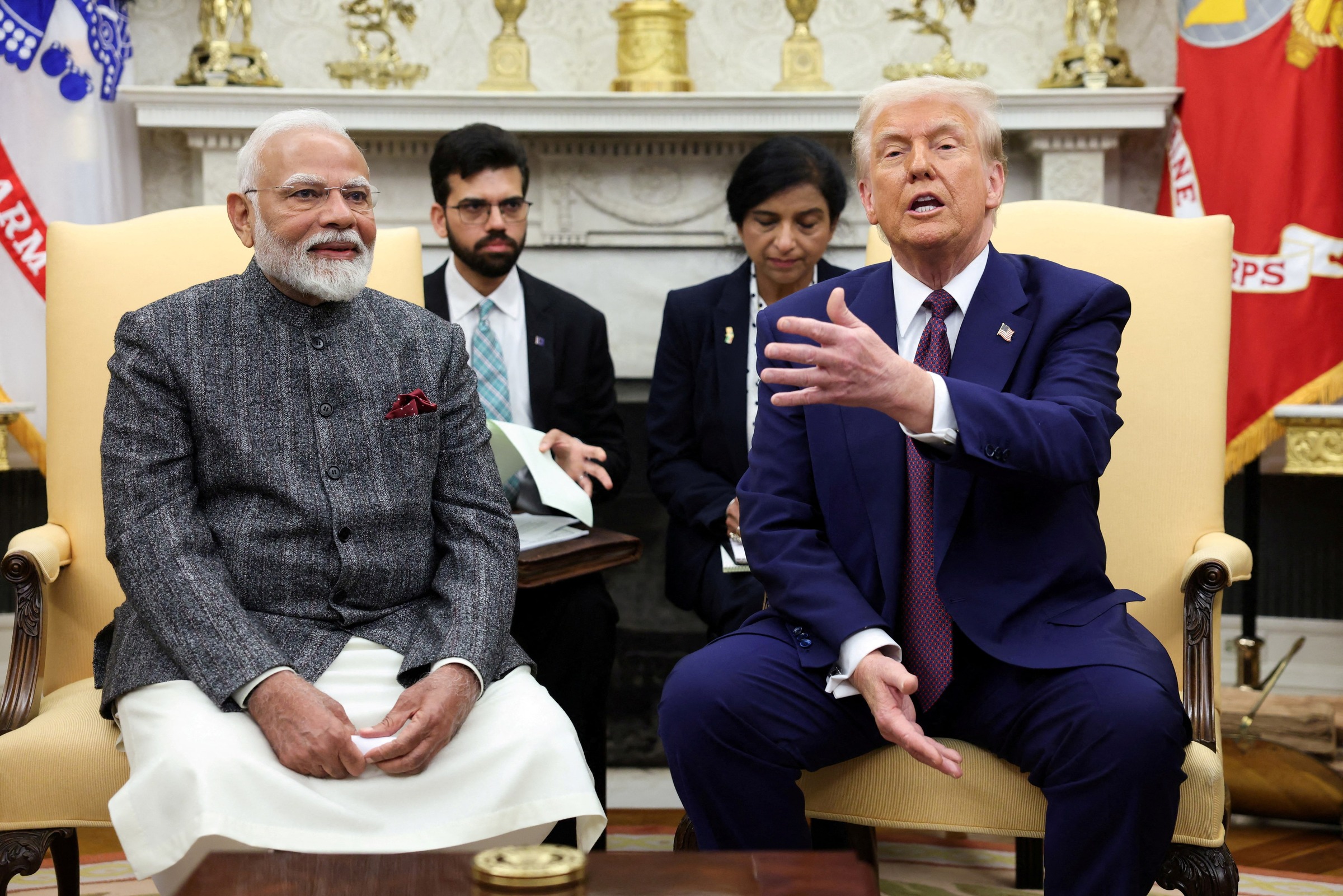When US Treasury Secretary Scott Bessent spoke last month about “some of India’s wealthiest families” profiting from the conflict in Ukraine, he didn’t name names. But in India, it was widely understood he was referring to Mukesh Ambani.
Ambani is not only India’s richest man, but also Asia’s, with an estimated net worth of over 100 billion USD. His conglomerate, Reliance Industries, touches nearly every facet of Indian life.
The “crown jewel” in Ambani’s empire is its crude oil refining business, which feeds India’s growing energy needs and exports around the world. In recent years, Reliance has ramped up purchases of discounted Russian crude, providing a windfall for Ambani and a lifeline for Russia as it has been isolated by the West.
 |
Mukesh Ambani, chairman of Reliance Industries, at the Jio World Centre in Mumbai, India, in 4/2023. Photo: Reuters
Now, as President Trump penalizes India for its Russian oil purchases and demands that New Delhi diversify its energy sources, the billionaire has suddenly found himself at the center of a crisis.
The Centre for Research on Energy and Clean Air (CREA), based in Finland, recently published an analysis showing that Reliance has purchased approximately 33 billion USD worth of Russian crude since the conflict in Ukraine began in 2/2022, accounting for about 8% of Moscow’s total crude sales.
“That’s an enormous number for one company,” said Vaibhav Raghunandan, an analyst at CREA.
Tom Keatinge, director of the Centre for Financial Crime and Security Studies at the Royal United Services Institute (RUSI), said much of this money has likely been used by Russia to fund the war in Ukraine, an accusation leveled by the United States as it has increased tariffs on India for not halting its Russian oil purchases.
Reliance, meanwhile, maintains that “its purchases of Russian oil do not reflect any political position regarding the conflict” and that the transactions are “in full compliance with all international regulations.”
Shipping data and vessel information show that since November of last year, at least 17 oil tankers sanctioned by the European Union (EU) or Britain for their ties to Russia’s energy sector have docked at Reliance’s port in Sikka, in the western Indian state of Gujarat.
At the Jamnagar refinery complex, not far from the Sikka port, Reliance turns the crude into diesel and gasoline, which fuels India and is exported to Europe and other parts of the world. Cheap Russian crude has increasingly become a major part of the operation.
Reliance does not deny this, but explains that British and EU sanctions do not have extraterritorial effect. “They do not apply to non-UK/EU entities. Therefore, Reliance is perfectly entitled to receive oil from such vessels,” the company said in a statement.
Data show that in 2021, before the Russia-Ukraine conflict, Reliance purchased only about 85 million USD worth of oil from Russia. The following year, that figure soared to 5.5 billion USD. Reliance’s purchases peaked in 2023 at 11.7 billion USD and dipped to 9.8 billion USD in 2024. From 1/1 to 12/8 of this year, Reliance’s purchases of Russian oil have already reached 6.2 billion USD, according to calculations by the Washington Post, verified by two independent experts.
This illustrates Reliance’s role in Russia’s oil export sector, which has helped the country weather Western sanctions and sustain its campaign in Ukraine. Last month, President Trump said India’s oil purchases were “fueling the Russian war machine.” He subsequently doubled the tariff rate on goods imported from India to the United States to 50%.
The Indian government insists its oil purchases are perfectly legal, noting that US officials had previously encouraged it to buy Russian crude to help stabilize global energy prices.
In late 2022, in an effort to pressure Moscow, the Group of Seven (G7) and the EU introduced a 60 USD per barrel price cap on Russian crude, allowing it to continue to flow but limiting Russia’s profits. India was encouraged by Western allies at the time to take advantage of the low prices to buy Russian oil to help prevent global market turmoil.
“We’re very happy that India is getting such a great deal,” said Janet L. Yellen, then the US treasury secretary, in 11/2022.
India’s Ministry of External Affairs now criticizes President Trump’s tariffs as “unfair, unjustified, and unreasonable,” insisting that the purchases of Russian oil are “based on market considerations.”
US negotiators were in New Delhi last week to try to advance stalled trade talks, but the issue of Russian oil remains a major sticking point. US media reported last month that President Trump made clear that he would not approve a trade deal with India unless it cuts back on Russian oil purchases.
Neither President Trump nor top economic officials in his administration have directly criticized Reliance. However, Reliance is the leading buyer of Russian oil in India, according to data from vessel-tracking firm Kpler, and it is likely to remain so for years to come.
In 12/2024, the company signed a deal to buy 500,000 barrels of crude per day from Russian state oil company Rosneft in a contract worth 13 billion USD annually over 10 years.
According to Benjamin Hilgenstock, head of research and macroeconomic strategy at the KSE Institute at the Kyiv School of Economics, there is “no reason for India to change” this purchasing program unless the West expands sanctions to make such purchases illegal.
Reliance Industries is a sprawling conglomerate with businesses ranging from retail and telecommunications to online entertainment and consumer finance. But its oil refining and management division remains its most prominent, accounting for about 58% of the conglomerate’s 125.3 billion USD in revenue, according to company figures.
About 50% of Reliance’s crude imports through August of this year came from Russia, according to Kpler, significantly boosting the company’s profits. The Financial Times recently reported that Reliance has made an additional 6 billion USD since 2022 from buying discounted Russian crude.
 |
Mukesh Ambani, chairman of Reliance Industries, at the Jio World Centre in Mumbai, India, in 4/2023. Photo: Reuters |
Mukesh Ambani, chairman of Reliance Industries, at the Jio World Centre in Mumbai, India, in 4/2023. Photo: Reuters
Reliance says that “India’s enhanced purchases of Russian crude after 2022 have helped stabilize the global oil market and prevent supply shocks.” The company states that “allegations of profiteering are baseless and unfounded.”
As his fortune has grown thanks to Russian crude, Ambani has sought to cultivate closer ties with President Trump. He attended President Trump’s inauguration in January, and the two shook hands and briefly spoke at a Qatari state dinner in May.
Trump’s daughter, Ivanka, and her husband, Jared, were guests at the lavish wedding of Ambani’s youngest son last year. According to the Wall Street Journal, the real estate arm of Reliance Industries paid 10 million USD for the right to use the Trump name in Mumbai, though details of the project remain unclear.
Analysts say that with tensions now focused on Russian oil between President Trump and Prime Minister Modi, Ambani is increasingly in the US crosshairs and in a difficult position.
At Reliance’s annual meeting in August, Ambani appeared to allude to the rising tensions. “There is no substitute for economic strength. This lesson has been reinforced by recent geopolitical developments,” he said. “India must achieve greater economic strength, and it must do so with a sense of urgency,” echoing a recent call by Prime Minister Modi for India to become more self-reliant.
Reliance stresses that its overriding commitment is “to adhere to the policy of the government of India to promote the energy security of the country through multiple sources of affordable and reliable energy supplies.”
Peter Navarro, Trump's chief economic architect, made scathing comments on 15/9, accusing Indian companies of “colluding with Russian refineries in the immediate aftermath of the conflict in Ukraine.”
In an apparent effort to ease tensions, President Trump last week called to wish Prime Minister Modi a happy 75th birthday and thanked him “for his support in efforts to end the Russia-Ukraine conflict.”
 |
US President Donald Trump welcomes Indian Prime Minister Narendra Modi to the White House in February. Photo: Reuters |
US President Donald Trump welcomes Indian Prime Minister Narendra Modi to the White House in February. Photo: Reuters
Experts warn that Trump’s strategy of pressuring India to reduce Russian oil imports may be flawed. Kush Amin, a legal specialist at Transparency International, an anti-corruption organization, said increasing tariffs is a “blunt” instrument that is likely to damage both the Indian and American economies.
A more targeted approach — imposing secondary sanctions on Reliance or its Jamnagar refinery — might be more effective, analysts say.
“If we want Ambani to stop doing this, we need to put pressure on Reliance,” Hilgenstock said. “We shouldn’t bet on somebody doing it just because they think it's the right thing to do.”
Vu Hoang (According to Washington Post, AFP, Reuters)












